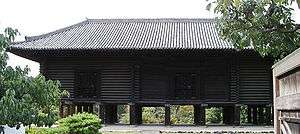Tenpuku
| History of Japan |
|---|
 |
Tenpuku (天福), also romanized as Tempuku, was a Japanese era name (年号, nengō,, lit. "year name") after Jōei and before Bunryaku. This period spanned the years from April 1233 to November 1234.[1] The reigning emperor was Shijō-tennō (四条天皇).[2]
Change of era
- 1233 Tenpuku gannen (天福元年): The era name was changed to mark an event or a number of events. The previous era ended and a new one commenced in Jōei 2.
Events of the Tenpuku Era
- 1233 (Tenpuku 1, 1st month): Kujō Yoritsune is granted the court post of provisional Middle Counselor (中納言 Chūnagon)[3]
Notes
- ↑ Nussbaum, Louis-Frédéric. (2005). "Tempuku" in Japan encyclopedia, p. 957; n.b., Louis-Frédéric is pseudonym of Louis-Frédéric Nussbaum, see Deutsche Nationalbibliothek Authority File.
- ↑ Titsingh, Isaac. (1834). Annales des empereurs du Japon, pp. 242-243; Varley, H. Paul. (1980). Jinnō Shōtōki. p. 227.
- ↑ Titsingh, p. 242; Varley, H. Paul. (1980). Jinnō Shōtōki, p. 272.
References
- Nussbaum, Louis-Frédéric and Käthe Roth. (2005). Japan encyclopedia. Cambridge: Harvard University Press. ISBN 978-0-674-01753-5; OCLC 58053128
- Titsingh, Isaac. (1834). Nihon Odai Ichiran; ou, Annales des empereurs du Japon. Paris: Royal Asiatic Society, Oriental Translation Fund of Great Britain and Ireland. OCLC 5850691
- Varley, H. Paul. (1980). A Chronicle of Gods and Sovereigns: Jinnō Shōtōki of Kitabatake Chikafusa. New York: Columbia University Press. ISBN 978-0-231-04940-5; OCLC 6042764
External links
- National Diet Library, "The Japanese Calendar" -- historical overview plus illustrative images from library's collection
| Preceded by Jōei |
Era or nengō Tenpuku 1233–1234 |
Succeeded by Bunryaku |
This article is issued from Wikipedia - version of the 10/6/2016. The text is available under the Creative Commons Attribution/Share Alike but additional terms may apply for the media files.